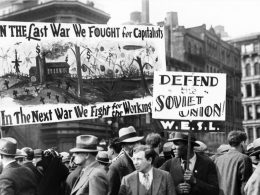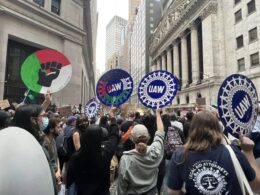If you’re committed to anti-imperialism, at some point you’ll need to make a choice: stay with the insularly focused leftist circles that seek to gatekeep the struggle, or break from these circles so you can help expand the movement into the broader masses. A year ago, when the Rage Against the War Machine event from February 2023 was first being argued over, those in this struggle were confronted with the need for us to make that decision. Some chose to join with RAWM and the mass-based practice it represents, while others chose to reject the coalition.
There are plenty of people in the latter camp who will never change their stance, as they’re too deeply invested in keeping favor with the established “left.” But there are also plenty who’ve been initially influenced by cynical “leftist” political actors which don’t have their interests in mind, and who still have potential to come to embrace a mass-centered strategy. They have an opportunity to make that transition with the Defeat the Deep State rally, which the original RAWM event’s organizers will put on next month.
Why do I describe this divide within the struggle as one between insularity and mass-based practice? Because when you look at the nature of the American “left” as it’s come to exist, you see that it doesn’t represent the majoritarian values which the old left represented. RAWM, an insurgent effort within the antiwar movement which deviates from modern “leftism,” is instead today’s upholder of those values.
The program that let the Communist Party USA gain a mass base and substantial influence during the 20th century was one which placed the party firmly against the side of monopoly finance capital. A program which made it clear that finance capital represents the side of the reaction towards historical progress, and must therefore be consistently opposed in favor of a people-oriented practice. This is what William Z. Foster clarified in his repudiation of Earl Browder, one of the actors who helped turn CPUSA into a controlled opposition org:
Comrade Browder’s misconception as to the progressive role of monopoly capital in the postwar period is further indicated by his playing down the initiative of the workers in formulating proposed governmental economic policies and his looking for programs rather to the big employers, “who must find the solution in order to keep their plants in operation.” There are also his flat acceptance of the two-party system, his indefiniteness as to what forces constitute reaction in the United States, his understress on the national election struggle, and his curt dismissal of the whole question of Socialism. Characteristic of Comrade Browder’s new conception of the progressive character, if not the actual leading role of monopoly capital, is the way he states the method of arriving at a national economic program, putting the capitalists first and the workers second. He says such a program must “rouse a minimum of opposition, from at least the two most decisive groups: first, the business men, industrial and finance capitalists and their managers, who have effective direction of the nation’s economy; and second, the working class, organized labor and the farmers.” This is putting the cart before the horse.
The actors within CPUSA who oppose RAWM and its ideas denounce Browder, trying to present themselves as the ones who will protect the movement from his compromised version of “socialism.” The irony is that by taking the stance that they do, they make themselves modern equivalents of Browder. Because with the way that today’s barriers of demarcation in the class conflict are drawn, those who seek to exclusively appeal to left-liberals are the ones on the side of finance capital, while those who seek to build a true anti-imperialist coalition are on the side of the program Foster put forth.
The names of finance capital’s friends and enemies have changed since Foster wrote this, but the class struggle continues to be primarily defined by who opposes and supports finance capital. And it’s the actors who seek to exclusively appeal to the left, while rejecting any attempts to build a mass base beyond that niche, which have picked the wrong answer to this question.
They try to deny this by portraying radical liberals as the ones with the most revolutionary potential. This was never correct, though. As Caleb Maupin has observed, one of the modern American left’s prime ideological leaders Sam Marcy overlooked how incompatible the New Left is with a revolutionary agenda: “The ‘New Left’ that Marcy’s followers embedded themselves in and pandered to while often concealing their own politics ultimately delivered the ‘stab in the back’ that destroyed the USSR. There’s a reason that Fidel Castro condemned rock music and drugs and other socialist states viewed counterculture with open contempt. The Marcyite tendency overlooked the illiberalism of socialist states and tragically under-estimated the importance of ideological and cultural struggle. The New Left should have been treated as a serious ideological threat, not a useful milieu to be courted and maneuvered within.”
This has become even more true since the 20th century. With the coming of the new cold war, the USA has undergone a political realignment, where left-liberals have become more solidly pro-imperialist while more conservatives and libertarians have become compatible with the anti-imperialist cause. The inescapable reality of the modern “left” is that when the Democratic Party, the corporate media, and the intelligence agencies have asked for the people to embrace an anti-Russian stance, the “left” is the element that’s most consistently followed the leadership of these tools for finance capital.
This has translated to that demographic coming to a more pro-war orientation in a broader sense. Even when Trump had been president for years, and Afghanistan was undeniably his war, Democrats had become more supportive of staying in Afghanistan than conservatives—who had in large part come to support Trump because they mistakenly believed he would end the USA’s addiction to war.
And leftists, even though they’ve developed enough compared to typical liberals that they’re theoretically against Washington’s military occupations, have in practice been increasingly undermining the antiwar movement. It’s from the social democrats that we’ve seen the most direct attacks against those who’ve sought to end the hybrid war against Syria. It’s from the anarchists that we’ve seen the most direct attacks against those who support China. And it’s from the Marcyists, in combination with the other imperialism-compatible left strains, that we’ve seen the most direct attacks against the pro-Russian communists. They’re the ones who last year put in the most effort, at the most crucial juncture, towards smearing the Rage Against the War Machine coalition.
The Marcyists are who I’ve come to struggle against the most because their exceptionally close proximity towards pro-Russian communists makes their rhetoric insidious, in a way that the social democrats and the anarchists aren’t capable of being. The Marcyists have supported Assad, and they’ve posited themselves as supporters of China (though the authenticity of their “support” is debatable, now that the escalations in Ukraine have prompted prime Marcyist leader Brian Becker to take a stance against multipolarity).
This record of taking correct (or seemingly correct) stances doesn’t just make them better able to gain the trust of developing radicals. It makes them better able to get that devotion from the types of developing radicals who are especially valuable to the cause. Who are willing to defy the State Department’s narratives on Syria, China, and the other countries which have come to represent major points of division within the socialist movement. The more correct things an opportunist org says, the better it can disguise its true purpose, and the more efficient it will be at sabotaging the struggle once we come to the struggle’s most pivotal moments.
Now that we’ve come to the point where communists must decide whether to leave behind liberal tailism, the Marcyists have in the end found themselves on the same side as the anarchists and social fascists. And this is even after these groups have fought so bitterly over issues like China. Once our class conflict escalated enough, all of these factions were going to unite with each other on their most important goal: preventing the rise of an anti-imperialist movement that’s not confined to left-liberals. Last February, everyone was forced to choose between aligning with the anti-popular “left” circles that finance capital has cultivated, and aligning with the anti-monopoly coalition.
Plenty of pro-China Marxists betrayed their values, and chose the side of reaction. It’s not too late for them to change their minds, though, and join with Defeat the Deep State. And however many or few of them do this, the event and the movement it represents are going to be just as capable of gaining support from the broader masses.
————————————————————————
If you appreciate my work, I hope you become a one-time or regular donor to my Patreon account. Like most of us, I’m feeling the economic pressures amid late-stage capitalism, and I need money to keep fighting for a new system that works for all of us. Go to my Patreon here.
To keep this platform effective amid the censorship against dissenting voices, join my Telegram channel.








